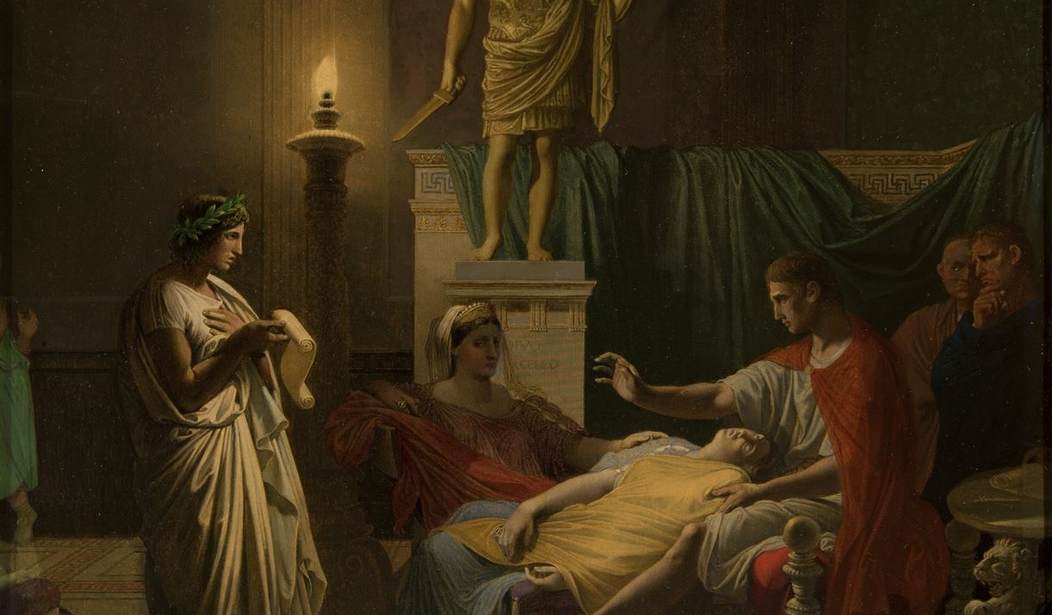“Salve, magna parens frugum, Saturnia tellus (hail, great parent of crops, Saturnian land)…” wrote the Roman poet in praise of his fatherland, Italy.
On Oct. 15, 70 B.C., the greatest poet of antiquity was born. Publius Vergilius Maro was for centuries considered the literary basis of Western Civilization — hence, the ambitious Dante made Virgil his guide through Hell and Purgatory. He was also the pagan poet closest to Christianity. His moral standards were startlingly high for a Roman pagan of the era, and he fascinated many with his prophecy of a time when a boy-god born under the sign of a Virgin would reign alone, without other deities, and bring harmony to all creation.
But while the topics of discussion related to Virgil's poetry are endless, there are times it is best simply to enjoy the beauty of his writing. True, no translation can ever quite match up with the original Latin, so carefully and artistically crafted down to every last dactyl and adjective, but a good translator can convey much of the power and charm of Virgil's images and rhythmic cadence.
We unfortunately in the 21st century are living through an age of mediocre or outright trashy literature. The sillier, shallower, and more politicized a "poem" is, the more likely it is to win prizes and be published, even if no one will ever read the tripe again afterwards or remember a single crude line. We would do well to restore beauty and truth to our art, if we would see our culture reformed and elevated.
Related: Columbus Day Was Established to Combat Ethnic Prejudice
Certainly, the "Laudes Italiae" or "Praises of Italy" from Virgil's Georgics are overflowing with beautiful images and turns of phrase, even in translation (Sotheby’s):
YET nor the Median groves, nor rivers rolled,
Ganges and Hermus, o’er their beds of gold,
Nor Ind, nor Bactra, nor the blissful land
Where incense spreads o’er rich Panchaia’s sand,
Nor all that fancy paints in fabled lays,
O native Italy! transcend thy praise.
Though here no bulls beneath the enchanted yoke
With fiery nostrils o’er the furrow smoke,
No hydra teeth embattled harvest yield,
Spear and bright helmet bristling o’er the field;
Yet golden corn each laughing valley fills,
The vintage reddens on a thousand hills,
Luxuriant olives spread from shore to shore,
And flocks unnumbered range the pastures o’er.
Hence the proud war-horse rushes on the foe,
Clitumnus! hence thy herds, more white than snow,
And stately bull, that, of gigantic size,
Supreme of victims on the altar lies,
Bathed in thy sacred stream oft led the train,
When Rome in pomp of triumph decked the fane.
Here Spring perpetual leads the laughing hours,
And Winter wears a wreath of Summer flowers;
The o’erloaded branch twice fills with fruits the year,
And twice the teeming flocks their offspring rear.
Yet here no lion breeds, no tiger strays,
No tempting aconite the touch betrays,
No monstrous snake the uncoiling volume trails,
Or gathers, orb on orb, his iron scales.
But many a peopled city towers around,
And many a rocky cliff with castle crowned,
And many an antique wall, whose hoary brow
O’ershades the flood, that guards its base below.
Say, shall I add, enclosed on every side
What seas defend thee, and what lakes divide?
Thine, mighty Larius? or, with surging waves,
Where, fierce as ocean, vexed Benacus raves?
Havens and ports, the Lucrine’s added mole,
Seas, that enraged along their bulwark roll,
Where Julian waves reject the indignant tide,
And Tuscan billows down Avernus glide?
Here brass and silver ores rich veins expose,
And pregnant mines exhaustless gold enclose.
Blest in thy race, in battle unsubdued
The Marsian youth, and Sabine’s hardy brood,
By generous toil the bold Ligurian’s steeled,
And spear-armed Volsci that disdain to yield:
Camilli, Marii, Decii, swell thy line,
And, thunderbolts of war, each Scipio, thine!
Thou Cæsar! chief, whose sword the East o’erpowers,
And the tamed Indian drives from Roman towers.
All hail, great parent! of Saturnian [fame],
Land rich in crops, and men of mighty name!
For thee I dare the sacred founts explore,
For thee the rules of ancient art restore,
Themes, once to glory raised, again rehearse,
And pour through Roman towns the Ascræan verse.










